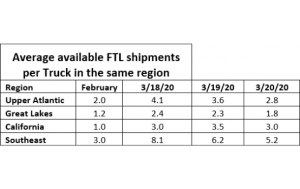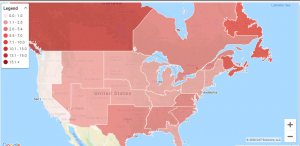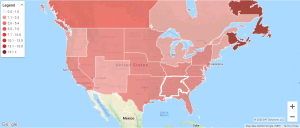
In an effort to provide you as much visibility to the current situation as possible, below is an update on the impact of COVID-19 on trade, since last week.
Many state governors across the country have ordered work from home mandates and closures for non-essential businesses. Mohawk is considered an essential business and will remain fully operational with the majority of staff working safely from home.
U.S. Customs
- No additional screening is required for cargo by CBP because medical professionals have advised that COVID-19 is transmitted by people, not cargo.
- CBP headquarters staff are working from home, if able.
- If congestion occurs due to a surge in imports—once the worst of the pandemic passes—CTPAT members’ cargo will be given priority.
- FDA import operations remain “functional and operational” but hard copy FDA notices of action may be delayed. FDA recommends importers and filers use Import Trade Auxiliary Communication System (ITACS) for current entry status.
- FDA has temporarily loosened on-site supplier audit requirements for importers under FSVP in recognition of the travel advisories and restrictions in place now due to the COVID-19 pandemic.
- U.S. trucks can proceed with U.S. drivers, even though the Canadian border is now closed to non-citizens.
- 161 trade associations have come together to appeal lifting Section 232 and 301 tariffs. At this time, the Trump Administration has stated their unwillingness to do so.
Ocean Ports & Terminals
Houston Port shut down Wednesday March 18 evening and reopened the evening of March 19, 2020.
East Coast Ports are just now starting to feel the impact of void sailings, having only 3 in the first half of March but 10 scheduled in the next two weeks. The Port of Baltimore shut down for a couple of days in early March, due low volumes. APM terminal began implementation of appointment system last week. All are expecting a drop in production stats up to 30 percent or more.
West Coast Ports have been declared ‘essential businesses’ by state and local entities and are therefore being properly manned to handle cargo flow, while complying with all health and safety standards.
Empty returns are still a problem at West Coast Ports but should be easing over next few weeks of vessel calls. MSC ran a sweeper ship to pick up empties bound for Asia. Terminal hours have been cut to match flow.
Rail terminals continue to operate normally, though equipment supply is short at interior points and will negatively impact export ability for the next month or so.
Full Truck Load (FTL)
Overall, capacity is getting tighter on the FTL market.
- The maps below show the regions by color code.
- The white/light pink means more trucks than shipments.
- The dark red means there are more than 15 shipments for every truck in the same region.
Last Month Available Loads per Truck

Available Loads per Truck as of 3/20/20
- Changes from day to day can be variable, but it is noticeable the California is on the upswing.
- The Upper Atlantic region had 2.0 loads for every truck in that region in February. On March 20th, there are 2.8 times as many FTL shipments as there were available trucks in the same region.
- The Great Lakes region had 1.2 loads for every truck in that region in February. On March 20th, there are 1.8 times as many FTL shipments as there were available trucks in the same region.
- California region had 1.0 loads for every truck in that region in February. On March 20th, there are 3.0 times as many FTL shipments as there were available trucks in the same region.
- The Southeast region had 3.0 loads for every truck in that region in February. On March 20th, there are 5.2 times as many FTL shipments as there were available trucks in the same region.
Less-than Truck Load (LTL) Capacity
- XPO and Pitt Ohio will no longer perform inside deliveries. Expect others to follow suit.
- Various consignees are asking drivers to not enter their facilities. Some are instituting procedures for drivers to text from their truck when they arrive. Then dock workers can come out to take paperwork, while driver remains in the vehicle. Expect this to expand.
- Pitt Ohio will no longer allow consignees to physically sign delivery documents. Expect others to follow suit.
- Old Dominion Freight Lines issued an advisory that all shippers should ensure consignees will be open for receiving. This guidance has been issued to help avoid additional charges for attempted deliveries to closed businesses.
- The Canadian border is closed but truckers are permitted to cross, as usual.
- Estes Express is no longer making inside deliveries to residences and is no longer requiring signatures for residential deliveries.
- FMCSA (Federal Motor Carriers Safety Administration) has expanded Hours of Service (HOS). Motor carriers carrying critical goods related to COVID-19 (medical supplies and equipment; masks, gloves, hand sanitizer, soap and disinfectants; and food for emergency restocking of stores) are relieved from normal HOS until the shipment is delivered. (Must be essential, non-routine cargo for the exemption to apply.)
- RIST Transportation has issued an alert that it will charge shippers for attempted delivery and return for any shipments it attempts to deliver to closed businesses.
India
India has been placed under lockdown through 3/31. All aspects of transportation have been affected, specifically trucking to the ports and airports. International passenger flights are cancelled through 3/31 and while freighters are available. Customs is operational but other aspects of the supply chain are severely impacted.
Germany
Germany is also on lockdown with 80% of staff working from home. Hamburg and Bremerhaven ports are still operating under normal conditions, although space is extremely congested and there is a shortage on available equipment. Trucking services are also operational within Europe, as of now. Due to heavy passenger flight cancellations, freighter space is limited.
We will continue to offer updates, as they come. In the meantime, please reach out to your Mohawk customer service representative with any questions.



